originally posted at https://canmom.tumblr.com/post/163181...
So a lot of wild shit just happened. In particular…
- Kanon can summon a cool magic sword and use it to fight good.
- The ‘Seven Stakes of Purgatory’ are all actually anime girls for some reason.
- Kanon and Jessica are dead.
- This is now a shonen anime.
We now have direct, unsimulatable evidence of magic onscreen. The only course left to insist magic is fake as shit is to deny the narration is entirely truthful.
We don’t, however, go down this route yet. Instead, we have Kinzo, Sayo and Genji.
Kinzo is, predictably, not all that upset that three of his four children have just been brutally murdered. After all, it’s all a game. He doesn’t really give a shit what the rest of the people in the house do.
There’s a weird line of dialogue:

Six times nine is of course fifty-four; six times seven is forty-two. It seems too simple a mistake not to be deliberate given the otherwise impeccable copy-editing in this game. This comes across as a Hitchhiker’s Guide reference, which I guess is somewhat plausible since it first aired in 1978, and Kinzo is obsessed with the West, though listening to a BBC sci-fi comedy seems out of character.
[Note from 2022: I can confirm that this is a correct translation of the spoken Japanese dialogue. And while it might be out of character for Kinzo, it would hardly surprise me for ryuukishi to throw out this kind of allusion lol.]
Unexpectedly, Kinzo decides to tell them ‘about everything’. He will dictate a will to Shannon. This ‘will’ soon turns into biography, and he briefly considers a record of his games. But he decides to start with his meeting with Beatrice, in the Shōwa era ‘towards the end of the war’. Sadly, we cut away before we can hear the rest of it.
In the chapel, the remaining cousins are wondering what to do, unaware Jessica and Kanon have been killed.
Outside, they come across the Seventh Pentacle of the Sun again. Maria wastes little time in explaining.
George comes up with an alternative theory: that the ‘Happy Halloween for Maria’ graffiti refers not to Maria, but the Virgin Mary, and it’s intended as blasphemy. Hmm… bit of a stretch.
Battler starts trying to puzzle out why Beatrice led the six adults to the chapel before killing them. We get some thinky music. It comes out that the chapel was important to Kinzo, but it’s not clear why, since he never prays. He once told Nanjo he might one day receive a blessing there, but it would take a miracle.
George notices some English text on the chapel. Battler can’t read it, and when Maria mocks him for it, he hits her. What the fuck! The text says, in Maria’s translation, “This door is only opened when a miracle occurs. You will be blessed only when a miracle occurs.” But it’s actually expressed in terms of a very small probability.
They speculate that the blessing would be Kinzo getting the chance to marry his old mistress Beatrice, now his original unnamed wife is dead. They agree that Kinzo probably built it to one day marry Beatrice inside, following a miracle.
Rosa realises there’s only one key to the chapel, and wonders how Beatrice could get inside if the key was in the envelope. That’s easy enough though - Beatrice could have given Maria an empty envelope, unlocked and locked the chapel, then carried the key to Maria’s room sealed in an envelope and switched it quietly with the existing envelope while she slept. After all, Rosa was able to sneak in without disturbing Maria.
At this point, meta-Battler interrupts. I’m surprised he had nothing to say during Kanon and Jessica’s deaths. Anyway, he is not impressed by another locked-room mystery.
Beatrice challenges him to explain it in human terms. Battler argues that there’s not enough information to narrow down a hypothesis. Beatrice argues that he’s refusing to engage, claiming he can’t think unless he has knowledge on the level of Laplace’s demon. Beatrice argues that a lack of information is actually to his advantage, since it keeps the space of possibilities open.
Hey, I can play too. Some possibilities:
- Beatrice switched Maria’s empty envelope with one containing the key, after she was done at the chapel
- there is a hidden entrance to the chapel
- Beatrice picked the lock (unlikely since we know the six adults were alive when they joined her in the chapel, but she could have opened it beforehand)
Battler argues for a devil’s proof again, arguing that it’s impossible to prove there was no way for someone to get in by mundane means.
meta!Battler says he (narrative!Battler) spent some time looking around in the chapel and found no hidden entrances. This happened off-screen. Does this mean that meta!Battler has a different set of knowledge to us? Perhaps meta!Battler only sees the story through narrative!Battler’s eyes?
Anyway, Battler argues along the lines of the same “absence of evidence is not evidence of absence” aphorism that there could be a hidden door he hasn’t found.
Beatrice is not impressed. She says she thinks locked-room mystery novels use the concept of a ‘locked room’ in the wrong way. She says you always ask “what trick did they use to make this look like a locked room”, so they’re never completely locked rooms.
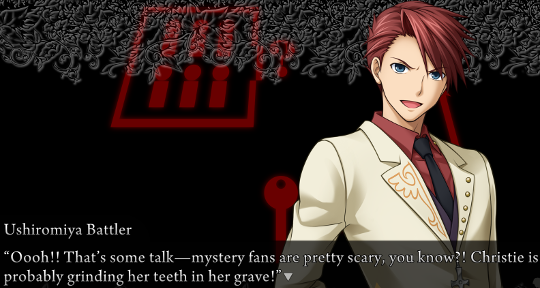
Battler is amused by this blanket dismissal of the entire genre.
Beatrice claims she can demonstrate, by contrast, that this is a true locked room. She asserts that the six people entered the room through the front door, by magic. Battler says nuh-uh, you’re lying. Beatrice says this is just going to be perpetual repetition. So she adds a new rule…
She says we fools always insist on a lack of information, and when given information, find reasons to doubt it. So…
![Beatrice: “That’s right. So from no own, [red]when I speak the truth, I will use red[/red].”](https://canmom.art/img/embed/umineko/ep2/134-truth.png)
Coloured letters! Yessss! It’s Homestuck time!
Battler doubts this (there’s no discussion about how he can see what colour the text in the dialogue box is). Beatrice says no, this is a rule, the rules are sacred. Battler decides to accept this.
So our first red statement: ‘Regardless of whether they were alive or dead, the six definitely entered through the door’.
That eliminates the hidden door hypothesis, but it’s still possible Beatrice switched the envelopes, or picked the lock.
Beatrice says that it wouldn’t be much of a game if she just did magic to ‘prove’ her abilities, so she’s going to go with this red-text axiom thing instead. Battler’s not allowed to ask for proof of red statements.
Battler questions whether there’s only one key after all. So we get ‘Only one key to the chapel exists’.
So Battler suggests a lockpick. Beatrice declares ‘It is impossible to unlock the chapel with anything but the chapel’s key’. (…except by magic, presumably).
Battler questions whether it is possible to open the door without unlocking it. Beatrice retorts ‘When the door to the chapel is locked, it prevents any and all methods of entry and exit’.
Battler catches a linguistic loophole. Beatrice clarifies ‘The six definitely entered through the front door’.
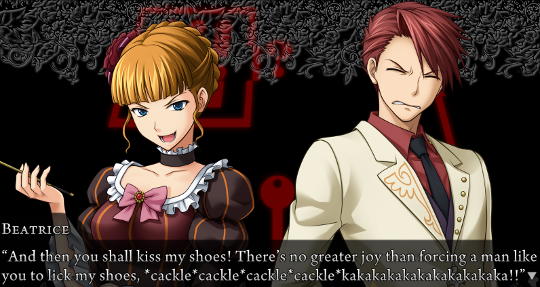
Beatrice thinks this is checkmate. God, keep it in your pants, Beatrice.

But there’s nothing that can’t be solved by…
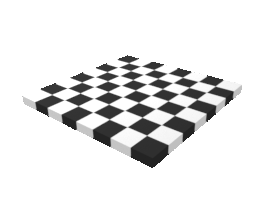
…a good old fashioned CHESSBOARD FLIP!
Battler comes up with a way to turn the red text rule on Beatrice.
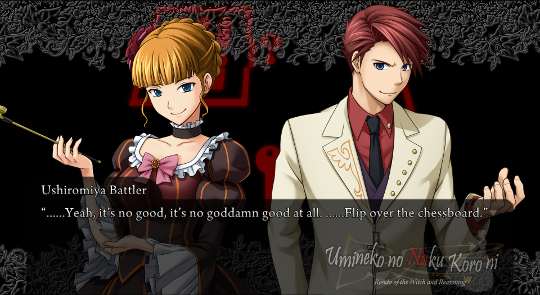
This screenshot is basically the entire game.
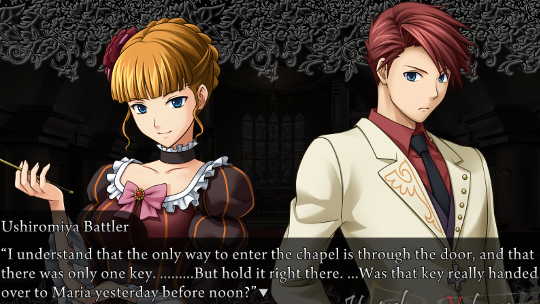
Battler, with rather a lot of drama, catches on to the envelope-switching theory. He challenges Beatrice to assert the key was in the envelope when she presented it to Maria.
Beatrice responds ‘This morning, Rosa definitely took an envelope out of Maria’s handbag, and from that obtained the genuine key to the chapel.’ What an obvious evasion! Battler catches it easily.
Beatrice is unable to assert the chapel key was given to Maria at noon. Well, well, well…
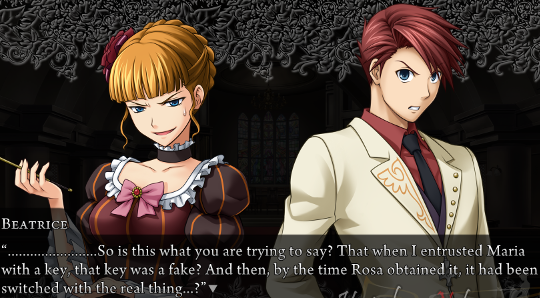
Beatrice summarises in one screen what Battler said in like, ten or more.
So Beatrice responds ‘The key to the chapel truly was the object inside the envelope I gave Maria.’ Note the lack of a timeframe in this statement. We do at least hear that the envelope was the same, so she couldn’t have just switched envelopes, but she could have opened this envelope, swapped the key, and sealed it again. At that point, the statement would be true.
Another possibility is that she gave Maria the key, but took it from her unnoticed, used it, and returned it to her.
Indeed Battler challenges her to say in red that the envelope was completely in Maria’s supervision until Rosa opened it. She has to decline! But she argues it’s only because Maria couldn’t see the envelope inside her handbag.
Battler challenges her to say nobody was able to touch Maria’s handbag until Rosa took the envelope out. She refuses, but does not explain why. Battler suggests this is checkmate.
A new piece of music kicks in. He argues much as I did above: at some point, the human Beatrice took the key from Maria’s handbag, and later returned it.
This gets a dramatic finger point.
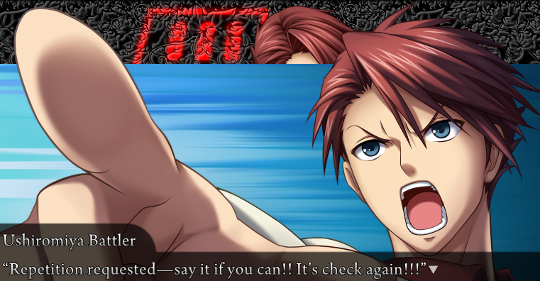
Beatrice appeals to the envelope being sealed. Battler challenges her to assert that the envelope Rosa opened is the same as the one Maria received. She does: ‘The envelope I handed over to Maria and the envelope Rosa opened are the same thing’.
Well, says Battler, that’s fine, envelopes can be re-sealed. He claims Beatrice betrayed his expectations by not resigning, and he’s disappointed, which leaves her pretty incredulous.
He gives a final challenge: ‘The key to the chapel inside the envelope Maria received wasn’t used even once until Auntie Rosa opened the envelope’. She can’t.
Beatrice is acting like she’s been defeated by a ‘lowly human’! For now, anyway. She challenges Battler to name who stole the key. Battler says this isn’t necessary to deny the existence of witches. He says he won’t accept that a human would do something so cruel.
Beatrice sees this as a weakness. I’m not sure why they’re ruling out a particularly cruel human taking on the Beatrice persona.
That’s the end of a chapter. I’ll try to be a bit less blow-by-blow in the next one. I was just enjoying the melodrama.
Comments